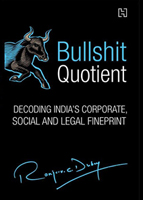| Sonia Jaspal's Risk Board:
Sep 27 2012
A Book Review: Bullshit Quotient
Ranjeev Dubey’s recently published book “Bullshit Quotient” (I am literary correct, and haven’t resorted to swearing on my blog) pulls the wool from the eyes. The lines in the introduction pages are – “Absurdly, in our cultural fabric, spotting the little lie is a skill called wisdom; spotting the big one is a sin called cynicism”. Hopeful idealists, who believe the world will become a better place to live, will be disillusioned and disheartened reading this book. The jaded cynics will find it provocative, amusing and ruthless. If you are willing to get your rose-tinted glasses peeled off, then read this book.

Ranjeev, an attorney by profession, wrote this diatribe on Indian corporate, legal and social world to call a spade a spade. It is rare in India, that an author chooses brutal honesty over the delicate footwork of political correctness and diplomacy. Below are my three main takeaways from the book.
1. The Cost of Economic Growth
Fittingly, Ranjeev has narrated the excessive cost of industrialization paid by economically backward and tribal communities (Adivasis) of India. Government on the pretext of acquiring land for development, irrigation etc. has made millions homeless. Without farming land and an education, these poor people have become slum dwellers in cities, and do menial tasks to make a meagre living. Those outraged by the injustice meted out to them, have joined Naxalite groups and terrorist organizations. Their anger has led them to a path of self-destruction, as after a couple of years they are either shot down in a police encounter or spend their life in prison. The urban class is completely apathetic to their plight, as they are focused on catering to their latest self-indulgence.
Nearly one-third of Indians live below poverty line, and India cannot become a powerful nation unless these poor people start earning a reasonable standard of living. Two big ones are required to change the situation. The anarchic land acquisition act needs to modified to give a fair price to land owners. Political will has to be strong to re-locate the displaced people.
2. Dependence of Independent Directors
Ranjeev has raised the same question as I did before – Are the independent directors really independent. Ranjeev’s strong opinion is – “In truth, independent directors are wall flowers, perching uneasily on the tenuous board seat, good to topple any time the promoter choses. They can’t protect themselves, leave alone the small shareholder”.
Aptly described; the independent directors appointment and continuance is dependent on the good will of the promoters. They are not in a position to take a strong stance, as they will be labelled troublesome and jeopardize other appointments. Even well-reputed industrialists sitting on other company boards restrain from rocking the boat. In the elite club, no one wishes to spoil the business equations. Hence, it is just a mirage that independent directors are the bastions of corporate governance and will defend small investor interests.
3. Auditor Role in Fraud
Objection, my lord; here, I beg to differ. Ranjeev has rightly pointed out auditors primarily responsibility is not to detect frauds. Auditors cannot be held responsible if a fraud remains undetected. But there are two statements, where my readers will have to defend the auditor’s reputation. Below are the extracts:
“It is not the auditor’s job to get into the details of books, records and documents. It follows that the auditor’s only job is to take a leisurely glance at the papers of the company puts before the auditor while daintily picking the sumptuous kebabs over the working lunch at the company’s office.” The lunch dig is true, it happens in India but auditors have to bury their noses in the books of accounts of the company.
The second one is more disparaging –
“He does not understand the company or its business, does not understand the environment in which the company operates and does not understand what is going on in it. His job is to look at the books and create more papers. Auditing is about reconciling paper trails, not truths.” Whoa, if an auditor hasn’t got his fundamentals right, then most probably he is delivering this poor quality work. Auditors need to figure out how to break these negative stereotype images and get appreciated for the value they offer.
Closing Thoughts
As we are given a choice between being an optimistic idealist and pessimistic cynic, I choose the former. Idealists are happy, cynics’ worldview is miserable. Nonetheless, we can’t ignore the atrocities, injustices and differences in our world. An idealist is better equipped to bring about a change, when the plans are grounded in reality. If reality stinks, we have to acknowledge and accept it before we devise a strategy for change.
This book describes the smelly portions of our society, which we want to close our eyes, ears and nose to. Besides it, the book has amusing wordplay. Here is line I liked – “Of all the bibulous ballyhoo that emerges from the loquacious lips of corporate kookaburras, the weirdest is the idea that the business of a company is delivery of value to its customers.” |
